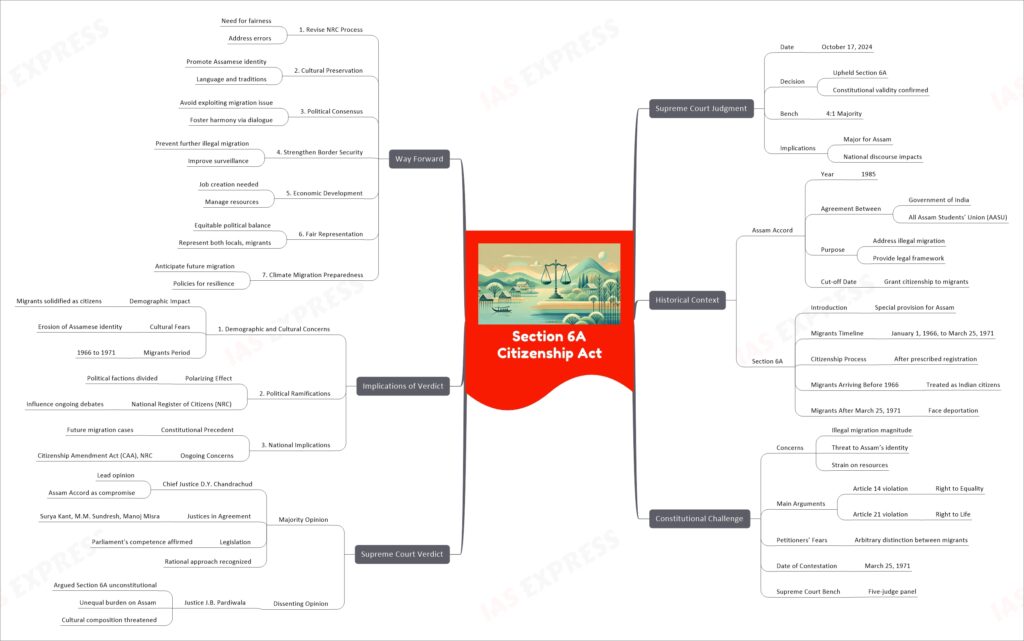SC Upholds Section 6A of Citizenship Act: Implications for Assam and India

From Current Affairs Notes for UPSC » Editorials & In-depths » This topic
IAS EXPRESS Vs UPSC Prelims 2024: 80+ questions reflected
On October 17, 2024, the Supreme Court of India delivered a pivotal judgment regarding Section 6A of the Citizenship Act, 1955, upholding its constitutional validity by a 4:1 majority. This decision has major implications for Assam, a state grappling with the challenges of illegal migration from Bangladesh for decades, especially in light of the Assam Accord. The verdict has far-reaching consequences not only for Assam’s demographic and socio-political landscape but also for the national discourse on citizenship, migration, and identity.

The Historical Context: The Assam Accord and Section 6A
To understand the significance of this ruling, we must first revisit the Assam Accord of 1985, which laid the foundation for the introduction of Section 6A into the Citizenship Act, 1955. The accord was signed between the Government of India and the All Assam Students’ Union (AASU) after years of protests and agitation against the influx of illegal migrants, predominantly from Bangladesh. It aimed to provide a legal framework to distinguish between Indian citizens and migrants in Assam, with a specific cut-off date for granting citizenship to migrants from Bangladesh.
Section 6A was introduced as a special provision applicable only to Assam, which allowed people who migrated between January 1, 1966, and March 25, 1971, to gain Indian citizenship after a prescribed registration process. Migrants who arrived before January 1, 1966, were to be treated as citizens of India, while those arriving after March 25, 1971, would face deportation.
The Constitutional Challenge: Why Was Section 6A Contested?
The primary reason for contesting Section 6A stemmed from concerns about the magnitude of illegal migration into Assam, which many local groups argued posed a serious threat to the state’s cultural identity, economic resources, and political stability. The fear of being overwhelmed by migrants led to several petitions being filed, challenging the constitutional validity of this section.
Critics argued that Section 6A violated Article 14 (Right to Equality) and Article 21 (Right to Life) of the Indian Constitution by creating an arbitrary distinction between migrants entering India before and after March 25, 1971. The challenge reached the Supreme Court, which formed a five-judge bench to examine its validity.
Supreme Court Verdict: A Divided Bench
On October 17, 2024, the Supreme Court delivered its judgment, with a 4:1 majority ruling that upheld the constitutional validity of Section 6A. Chief Justice D.Y. Chandrachud, writing the lead opinion, emphasized that the Assam Accord was a political compromise designed to address the unique situation faced by Assam, where illegal immigration had reached alarming levels.
The majority opinion held that Parliament had the legislative competence to enact this provision and that it did not violate any fundamental rights under the Constitution. Justices Surya Kant, M.M. Sundresh, and Manoj Misra concurred, affirming that Section 6A represented a balanced and rational legislative approach to a complex issue.
However, Justice J.B. Pardiwala dissented, arguing that Section 6A should be struck down as unconstitutional, stating that it created an “unequal burden” on Assam by allowing a large influx of migrants to become citizens, which disproportionately affected the state’s demographic and cultural composition.
Implications of the Verdict
The Supreme Court’s decision to uphold Section 6A has several implications for Assam and India:
1. Demographic and Cultural Concerns
One of the most immediate concerns for the people of Assam is the impact of this verdict on the state’s demographics. The influx of migrants from Bangladesh has been a contentious issue for decades, with many fearing that it could lead to an erosion of Assam’s cultural identity and place an unsustainable strain on resources. By upholding Section 6A, the court essentially confirms that those who entered Assam between 1966 and 1971 can now become Indian citizens, potentially solidifying the presence of a significant number of migrants in the state.
2. Political Ramifications
Politically, the ruling could have a polarizing effect. Assam has seen decades of agitation around the issue of migration, and various political factions could either support or oppose the ruling based on their constituencies’ demographic concerns. It may also influence the National Register of Citizens (NRC) and ongoing debates over citizenship amendments, potentially leading to further litigation and political disputes.
3. National Implications: Migration and Identity
While Section 6A applies specifically to Assam, its constitutional validation could set a precedent for future cases related to migration and citizenship. As migration continues to be a major issue in other parts of the country, especially with ongoing concerns about the Citizenship Amendment Act (CAA) and NRC, this ruling could influence legal interpretations and future judgments.
Way Forward
With the Supreme Court upholding Section 6A, the challenges for Assam and India are far from over. This ruling sets the course for several key actions:
1. Revise the NRC Process
The National Register of Citizens (NRC) needs a fair and accurate implementation. Errors in previous processes must be addressed, ensuring that legitimate citizens are not wrongfully excluded.
2. Cultural Preservation
Assam’s cultural identity remains a core concern. The government must invest in promoting local languages, traditions, and cultural programs to preserve the state’s rich heritage while integrating new citizens.
3. Political Consensus
There is a need for constructive political dialogue to ensure that the issue of migration is not exploited for political gains. Political leaders must prioritize Assam’s long-term stability and engage local communities in discussions to foster harmony.
4. Strengthen Border Security
Securing the India-Bangladesh border is essential to prevent further illegal migration. Improved surveillance and border management systems must be put in place to address this ongoing concern.
5. Economic Development
Promoting economic growth is crucial to mitigate tensions. Investment in job creation, infrastructure, and resource management will help alleviate competition between locals and migrants, ensuring better integration.
6. Fair Representation
Ensuring that the demographic changes do not lead to political imbalance is critical. There must be equitable political representation for both local Assamese and migrant communities to maintain social stability.
7. Climate Migration Preparedness
Given Assam’s vulnerability to climate change, future migration due to environmental factors should be anticipated and addressed with policies focused on climate resilience and sustainable development.
Conclusion
The Supreme Court’s ruling on Section 6A represents a significant moment in India’s ongoing efforts to balance humanitarian concerns with national security and cultural preservation. While the judgment provides legal clarity, the road ahead remains challenging, requiring collaborative action from governments, political leaders, and communities to navigate the complexities of migration and identity in Assam.
Practice Question
Discuss the implications of the Supreme Court’s recent verdict upholding Section 6A of the Citizenship Act, 1955, for Assam’s demographic, cultural, and political landscape. (250 words)
If you like this post, please share your feedback in the comments section below so that we will upload more posts like this.

